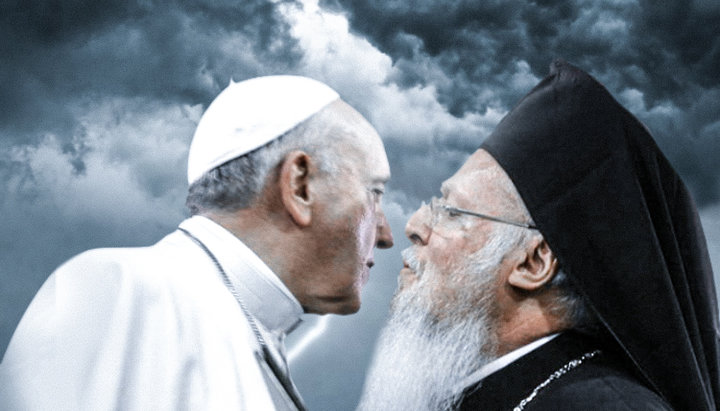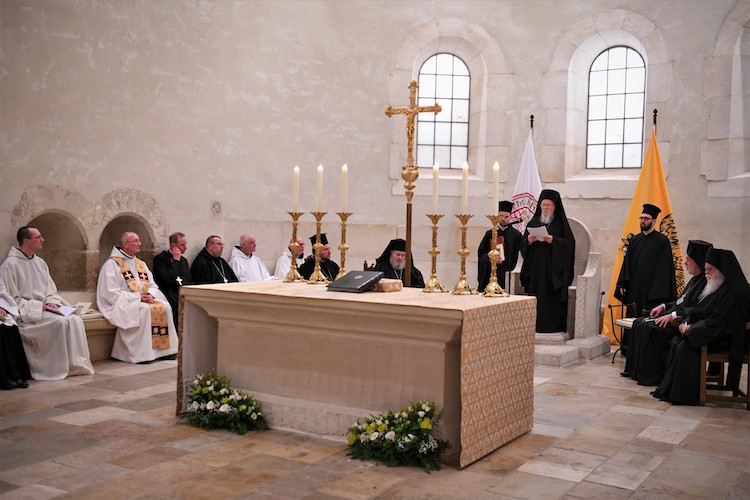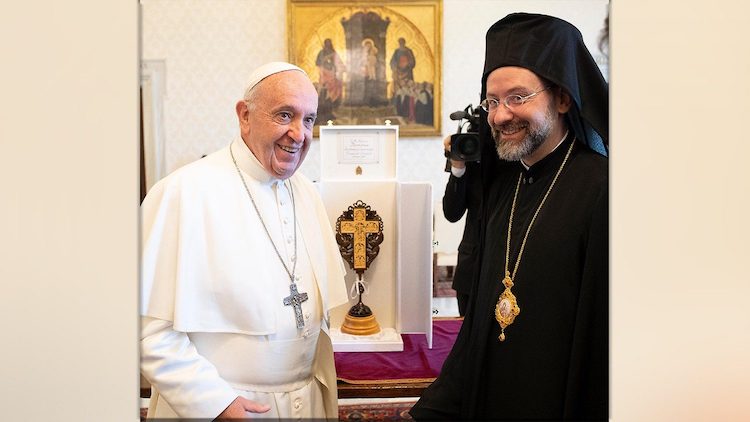Church and Simulacrum-2: what awaits those who will obey Phanar’s rule

How probable the merger of Constantinople with Rome is and how this threatens World Orthodoxy.
Recently, the activity of Patriarch Bartholomew in promoting the idea of unification with the Latins has stepped up significantly.
On November 12, 2019, Patriarch Bartholomew, together with the abbot of the Athos monastery Xenophontos, Archimandrite Alexis, hieromonk of Pantokrator monastery Theophilos, and other Athonite brethren participated in joint Vespers at the Catholic monastery of Notre Dame de Saint-Remy in Rochefort.

During his visit to Athos on October 19-22, the head of Phanar said that Catholics and Orthodox are only separated by some historical differences rather than by dogmas, therefore the unity between them is inevitable.
On November 23, Patriarch Bartholomew hosted a delegation of Sulhan Saba Orbeliani University of Tbilisi, led by the Catholic Bishop of the Caucasus, Giuseppe Pasotto. At the meeting, the patriarch said that dialogue with the Roman Catholic Church is one of the priorities for the Patriarchate of Constantinople.
And in the summer of 2019, the Archbishop of Telmessos, Job (Getcha), as the head of the Phanar delegation, brought to the Vatican a letter from Patriarch Bartholomew with the following words: “The re-establishment of the (Eucharistic – Ed.) communion between our Churches remains our sincere hope, the main object of our prayers and the goal of a dialogue of truth established between our Churches."

In response, Pope Francis said: “As the bishop of Rome, I would like to emphasize once again that for us, Catholics, the goal of the dialogue is complete unity in authorized differences rather than unifying alignment, and much less absorption.” And then unexpectedly (according to the official version) he presented a casket with the relics of St. Peter the Apostle to the Phanar delegation.
It is very likely that Pope Francis and Patriarch Bartholomew will not fail to take advantage of a very beautiful occasion to fulfill their plans to unite their subordinate structures, namely – the 1700th anniversary of the First (Nicene) Ecumenical Council, which will be in 2025.
This is not just a beautiful date. During the First Council, the issue of the origin of the Holy Spirit, the so-called filioque, had not yet arisen. Therefore, it is very convenient to leave this most important disagreement between the Orthodox and Latins behind the brackets and say that today the creed of neither the Orthodox Church nor the Catholic Church is different from that of the Council of Nicaea.
Of course, this will be a lie, but the lie that is beautiful and quite acceptable for the supporters of the union. Despite the fact that before the round date is even more than five years, time is running out. Both Pope and Patriarch Bartholomew designated for themselves a strategic program – complete unity of their faiths. Time is really short in order to achieve this goal and it's not about just having another ecumenical prayer.
The first task in preparing this new union is being solved before our very eyes. It is to create a religious organization, which Patriarch Bartholomew will lead to unification with the Catholics. Indeed, now the Local Orthodox Churches are divided not only into those which recognize and which do not recognize the Orthodox Church of Ukraine (OCU) but into those which recognize the supremacy of the Patriarch of Constantinople over themselves and those which attribute this supremacy exclusively to Christ.
There is another criterion for separation, which is not so noticeable at first glance. The recognition by Phanar of the schismatics and the joint celebration of the liturgy with those who do not have a real hierarchal rank are acts so flagrantly lawless that recognition by other Local Churches can take place only under powerful external pressure.
If the Local Churches did this according to their inner conviction or, as Patriarch Theodore of Alexandria said, after sincere prayers, they would not have procrastinated with the recognition of the OCU for almost a whole year.
And so the voyages of the representatives of the US State Department and their forcing through the recognition were so explicit that there is no doubt: all those who recognized the OCU, roughly speaking, had been bent over their knee by the American officials.
The Local Orthodox Churches are now divided not only into those which recognize and which do not recognize the Orthodox Church of Ukraine (OCU) but into those which recognize the supremacy of the Patriarch of Constantinople over themselves and those which attribute this supremacy exclusively to Christ.
Therefore, there is now a new criterion for the division of the Local Churches: those who can be bent over their knee and those who cannot. And for those who were once made to commit lawlessness, it will not be difficult to commit lawlessness again and again ...
One can sincerely feel sorry for the Alexandrian Patriarch Theodore, the Greek Orthodox Archbishop Ieronymos, the abbot of the Athos Xenophontos Monastery, Archimandrite Alexis, and many others who caved in under the State Department. “People are slaves to whatever has mastered them” (2 Peter 2: 19). Having recognized the supremacy of the Patriarch of Constantinople in terms of the unlawful recognition of the OCU, they will be forced to recognize other unlawful decisions of Phanar, including the decision to merge with the Vatican.
What did Phanar actually do? It made its own decision on the OCU and forces others to recognize this decision. After all, Phanar did not submit it for a conciliar discussion.
So will it be in the matter of union with the Latins. Phanar will decide – and all others will obey. In case of emergency, employees of the State Department will join in to raise awareness of the "policy line". Right now, the structure is being formed, which consists of the brainwashed, broken and ready to obey.
We have already written how the Simulacrum differs from the true Church of Christ:
- recognition in the Church of the supremacy of the Patriarchate of Constantinople rather than Christ;
- recognition of the false consecrations of the “hierarchy” of the OCU, i.e. recognition of the action of the Holy Spirit where it does not exist.
The Greek and Alexandria Churches have already joined this Simulacrum. True though, not in full force. In these Churches there are hierarchs who are dead-set against the Simulacrum. There are just a few of them so far, and it is still unknown how far their determination will go in upholding their opinions. Will they leave the canonical subordination of their hierarchy or will they remain part of their Local Churches?
What other Churches will recognize the supremacy of Patriarch Bartholomew is unknown. But no matter how many there may be, they are going to accede precisely to the religious organization, on behalf of which the patriarch will speak on unification in negotiations with the Vatican.
Pope Francis, by the way, has no such problems: he is an indisputable head of his Simulacrum.
The Holy Fathers recognized that the Church is one and single in the world. Jesus Christ did not create two or more Churches. He created One Church and the gates of hell cannot overcome Her.
The theory is untenable that this One Church was divided into branches over time. In this case, it must be recognized that the Church as such on earth does not exist, but there are a certain number of “semi-churches”. Yet, the apostle Paul said, “Let it not be!”
And here we are approaching the question why not really get united with the Catholics. After all, the Lord urged: “that all of them may be one” (John 17: 21). But the fact is that the Lord called to be one in Truth, not in a lie: “that all of them may be one, Father, just as you are in me and I am in you. May they also be in us so that the world may believe that you have sent me” (John 17: 21).
In turn, Patriarch Bartholomew calls to be united in a lie. This is substantiated by his words on Athos that between the Orthodox and Catholics there are not any dogmatic but only historical differences. “The more horrible your lie is, the sooner they will believe you” is the phrase attributed to Goebbels, which actually belongs to Hitler. The discrepancies between the Orthodox and the Latins are precisely dogmatic. These are questions of the salvation of the human soul, and not just, as ordinary people think, that the Orthodox cross themselves from right to left, while Catholics – from left to right.
Let’s recall briefly these discrepancies.
Firstly, it is a filioque in the Creed. The Latins decided that the Holy Spirit comes not only from God the Father, but also from God the Son. In addition to the fact that this statement is contrary to Scripture, it leads to the actual denial of the divinity of the Holy Spirit, and therefore the whole Holy Trinity. God is essentially one and threefold in Persons. It means that each Person of the Most Holy Trinity can possess either the general properties of the Divine – eternal existence, omniscience, omnipresence, etc. – or personal properties that are unique to this one Person of the Holy Trinity: the Father gives birth to the Son and bears the Holy Spirit, the Son is born from the Father, the Holy Spirit comes from the Father.
With the adoption of the filioque, the doctrine of the Holy Trinity was accepted, whereby the Father and the Son possess a property that the Holy Spirit does not possess. Thus, the fact that there is some inferiority of the Holy Spirit in comparison with the Father and the Son penetrates into the dogma of the Trinity. And since God, by definition, cannot be flawed, the filioque leads to the denial of the Divinity of the Holy Spirit. Again, in the words of the holy Apostle Paul: “Let it not be!”
Patriarch Bartholomew calls to be united in a lie. This is substantiated by his words on Athos that there are not any dogmatic but only historical differences between the Orthodox and Catholics.
In addition to a purely speculative distortion of the dogma of the Holy Trinity, the doctrine of the filioque leads to the most practical consequence. If the Holy Spirit is not God, then who then sanctifies the holy gifts during the liturgy? After all, only God, God without the slightest inferiority (which is deduced from the filioque) can turn the Holy Gifts to the Body and Blood of Christ. “Having invoked Your Holy Spirit on the Gifts ...” (priest's prayer at the liturgy).
If this is not so, then what do we partake of? And do we have hope for salvation without partaking of the true Body and Blood of Christ? After all, the Gospel testifies very clearly: “Jesus said to them: Verily, verily, I say unto you, unless you eat the flesh of the Son of Man and drink His blood, you will not have life in you” (John 6:53).
Actually, Catholics themselves feel this, because they do not have the prayer of invoking the Holy Spirit at the liturgy.
Secondly, this is the dogma of the primacy of the pope. “If the part of the dough offered as firstfruits is holy, then the whole batch is holy; if the root is holy, so are the branches” (Rom. 11:16). If the head of the Body of the Church is Christ, we are saved. What about the pope?
Saint Ignatius Brianchaninov described this dogma with the following words: “Papism appropriates to the pope the attributes of Christ and thereby rejects Christ. Some Western writers almost explicitly uttered this renunciation, saying that it is much less sin to renounce Christ than the sin of renouncing the pope. The pontiff is an idol of the papists, he is their deity. Because of this terrible error, the grace of God departed from the papists; they are devoted to themselves and Satan – the inventor and father of all heresies, papism among others ... No heresy expresses its exorbitant pride, cruel contempt for people and hatred for them so openly and arrogantly."
With the removal of Christ from a dominant position in the Church, the Church ceases to exist. “They don’t have a church (Latins – Ed.), because the union with the Head was broken” (Archimandrite Ioann (Krestyankin)).
There is no need to say that this dogma is contrary to the Holy Scriptures because of complete evidence.
Thirdly, this is the dogma of the Immaculate Conception of the Blessed Virgin Mary. The Catholics, of course, do not claim that the Mother of God conceived, like Christ, from the Holy Spirit. But they say that at the very moment of her conception, She was freed from the original sin of Adam. Besides the fact that this contradicts the Scriptures (“Wherefore, as by one man sin entered into the world, and death by sin; and so death passed upon all men, for that all have sinned” (Rom. 5:12)), the dogma of the Immaculate Conception leads to the fact that the Christ's Sacrifice of the Cross was in vain in relation to the Mother of God. She did not need it in this case. What is this if not blasphemy against the Savior?
Fourthly, this is the Catholic doctrine of salvation. Anselm of Canterbury invented it shortly after the Latins broke away from the Church in 1054. This teaching is expressed in purely legal categories. Adam violated the commandment and thereby offended God. Satisfaction must be paid for the insult. But since God is infinite, the insult, and therefore the satisfaction, must also be infinite. And such an endless satisfaction could only be paid by the infinite God Jesus Christ.
Thus, the relationship between God and man appears as litigation: who owes what to whom. There is no place for love, just as there is no place for the correction of the fallen nature of man. For the Orthodox, salvation is a return to the heavenly Father Who loves us, while for Catholics – payment of the debt.
From the above doctrine, which places the relationship of God and man into a legal framework, the doctrine of the super-merit of saints, indulgences, etc arose. Indulgences, by the way, exist today, the current "Guide to Indulgences" ("Enchiridion Indulgentiarum") was adopted by the Vatican in 1967.
No less significant differences in the image of holiness and prayer adjoin dogmatic differences. Whereas in Orthodoxy a correct spiritual life leads to a vision of one's sins, then in Catholicism the life leading to consciousness of ones’s holiness is considered correct.
With the removal of Christ from a dominant position in the Church, the Church ceases to exist.
St. Venerable Sisoy the Great (V century) before his death said, "Verily I do not know if I even started my repentance." All the Orthodox saints experienced similar humility, the awareness of their sinfulness and trust in God. But the "saints" in Catholicism recognize the exact opposite. “I do not acknowledge for myself any sin that I could not atone for by confession and repentance” (Francis of Assisi, XIII century).
The way of spiritual work, which is cultivated in Catholicism is called in Orthodoxy directly and clearly – delusion.
The founder of the Jesuit Order Ignatius Loyola (XVI century) in the book “Spiritual Exercises” calls for the imagination of God, the crucified Christ, angels, the Most Holy Theotokos, saints, etc.
Orthodox holy fathers strictly prohibit this as the one leading to delusion. For example, the Monk Gregory of Sinai (XIV century) writes: “They say that delusion comes into two forms, or, rather, it is found in the form of fantasies and impacts, although it is originated and caused only in and by pride . <...> The first image of delusion comes from dreams. The second image <...> has its beginning <...> in voluptuousness, born of natural lust. In this state, a tempted person dares to prophesy, give false predictions. <...> The demon of indecency, clouding their minds with voluptuous fire, drives them crazy, shows some saints to them in their fantasies, lets them hear their words and see their faces.”
All these discrepancies of the Latins with the teachings of the Church of Christ, which have been established in Catholicism for almost a thousand years, leave no doubt: Latinism has long turned into Simulacrum, which nowadays is losing even the outward signs of the Church of Christ, not to mention the essence. And this Simulacrum is what Patriarch Bartholomew proposes to unite with.
Undoubtedly, on the eve of the emerging unification of these two Simulacra, those who were forced to recognize the OCU, having turned a blind eye to the gracelessness of their “hierarchy”, will also be forced to turn a blind eye to all the above-mentioned errors of Catholics.
The only thing that can somehow affect the course of events is the refusal of the rest of the Local Churches, which have not yet recognized the supremacy of Phanar, to participate in such lawlessness, as well as the firm confession of faith by those hierarchs of the Greek and Alexandrian Churches who are aware of what they are being led to by Patriarch Bartholomew.











